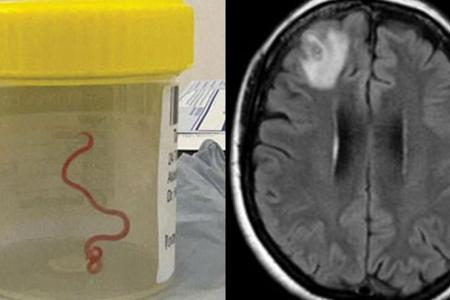‘Alive and wriggling’: Live worm found in woman’s brain in Australia
A live parasitic roundworm has been found in a woman’s brain by Australian medical experts, marking the world’s first case of the parasite found in humans.
The 8cm Ophidascaris robertsi roundworm, was discovered in a 64-year-old England-born woman after a brain surgery, by doctors and researchers at the Australian National University (ANU) and Canberra Hospital.
The “string-like structure” could have been in the brain for up to two months, reported the BBC.
The parasite, is a commonly found in carpet pythons - which are non-venomous snakes found in Australia. It is not found in humans.
Other organs in the woman’s body were also suspected to be infected by the worm’s larvae, reported Al Jazeera on Tuesday.
“This is the first-ever human case of Ophidascaris to be described in the world,” said Dr Sanjaya Senanayake, a leading infectious disease expert at the ANU and Canberra Hospital, in a statement.
“To our knowledge, this is also the first case to involve the brain of any mammalian species, human or otherwise.
The case was documented in the September edition of the journal Emerging Infectious Diseases, said The Guardian.
Dr Senanayake recalled, in a report by The Guardian on Monday, that his neurosurgeon colleague Hari Priya Bandi saying, “Oh my god, you wouldn’t believe what I just found in this lady’s brain – and it’s alive and wriggling.”
Dr Bandi, who pulled the parasite from the woman, called Dr Senanayake and other hospital colleagues for advice about the next steps, reported the Guardian.
In late January 2021, the woman from south-eastern New South Wales was first admitted to a local hospital. This was after she suffered three weeks of abdominal pain and diarrhoea, followed by a constant dry cough, fever and night sweats.
By 2022, the woman’s symptoms experienced depression and forgetfulness, prompting a referral to Canberra Hospital. An MRI scan found that the woman’s brain had abnormalities that required a surgery, reported The Guardian.
“But the neurosurgeon certainly didn’t go in there thinking they would find a wriggling worm,” said Dr Senanayake in The Guardian. “Neurosurgeons regularly deal with infections in the brain, but this was a once-in-a-career finding. No one was expecting to find that.”
The woman lives near a lake area which is inhabited by carpet pythons, reported The Guardian.
Researchers believe that the woman was infected after foraging for edible shrubs near her house. These were likely contaminated with parasitic larvae shed in snake faeces, reported AFP.
Get The New Paper on your phone with the free TNP app. Download from the Apple App Store or Google Play Store now


